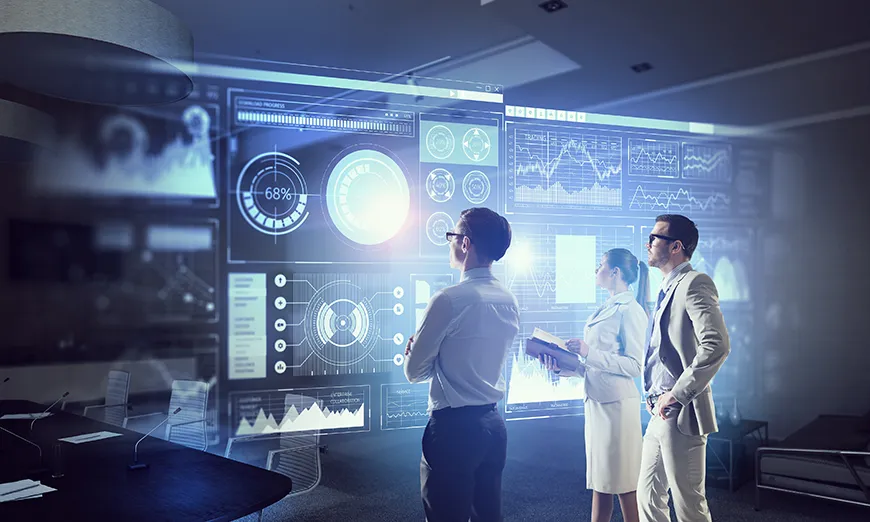Entrepreneurship•June 2, 2023
Skip to main content





The world, as we know it, changes.
We are moving toward more renewable sources of energy, like solar energy. We are creating autonomous driving cars and artificial intelligence systems that change how we engage with our work and reality.
It might seem overwhelming to you. However, amid all these changes, if you can adapt, you can take advantage of technological improvements and use them as opportunities for growth.
In the following article, we’ll explore the impact of technological advancements on society and individuals and discuss how individuals and businesses can prepare for the changes.
The Technological Innovation Revolution: Are You Ready?

Instead of being afraid of technological innovation, embrace and use it to your advantage.
What is Technological Innovation and Examples?
Technological innovation refers to developing and implementing new technologies, processes, or methods that improve existing systems or create new growth opportunities. Solar energy, machine learning, and artificial intelligence (AI) are prime examples of technological innovations driving changes for businesses using a traditional business model and creating opportunities for sustainable growth.
In 2021 renewables made up 38.3% of the worldwide electricity generation capacity, a rise from 36.6% in 2020, IRENA said in its annual statistical report. They grew by 9.1% overall and reached 3.06 terawatts.
Solar and wind power accounted for 88% of new renewable energy capacity additions. Solar energy saw a 19% growth, while wind energy experienced a 13% rise. Overall, solar photovoltaic capacity exceeded wind capacity, reaching 840 gigawatts compared to 825 gigawatts.
In other words, the growth in solar photovoltaic capacity, outpacing wind capacity, demonstrates the increasing importance and adoption of solar energy as a viable and sustainable power source. As the costs of solar panels continue to decrease, solar energy is becoming a more attractive solution for businesses and homeowners alike.
Companies like Tesla are making efforts to gradually adopt solar energy as a replacement for harmful energy sources while also making it aesthetically pleasing enough for use on the rooftops of houses. Tesla created tiles that produce clean energy and also look great, making them popular among environmentally conscious homeowners.
Machine learning, a subset of AI, is another driving force of the technological innovation revolution. Machine learning algorithms can analyze large datasets and make predictions based on patterns and trends in the data. That technology has a wide range of applications, from healthcare to finance, and it continues to revolutionize the way we approach problem-solving and decision-making.
A notable example of machine learning in action is Google's DeepMind, which developed AlphaFold, an AI system that accurately predicts protein structures. This breakthrough has significant implications for drug discovery and understanding diseases, paving the way for more targeted and effective treatments.¹
What Are Some Technological Innovations from Today?
ChatGPT is an advanced natural language processing model developed by OpenAI. It is capable of understanding context, engaging in conversation, and providing answers or suggestions. Businesses are leveraging ChatGPT to enhance customer service, automate processes and provide personalized experiences.
This is only a natural consequence as the momentum toward AI technology adoption already exists. In a report created by McKinsey, a Global Management consulting firm, from 2,395 participants representing a large range of regions, industries, company sizes, and functional specialties, 50% of the participants reported that their companies had adopted AI in at least one business function.
These figures represent the year 2020. Nowadays, the number of businesses adopting AI technology is much higher. ChatGPT 4 is a highly advanced artificial intelligence system that can be a great tool for solving complex problems but also comes with serious societal implications.
OpenAI, the company that created ChatGPT, investigated its impact on society and found out that approximately 80% of the US workforce could have at least 10% of their work tasks affected by the introduction of GPTs, while around 19% of workers will see a larger impact, about 50% of their tasks impacted.
Artificial intelligence will gradually change how we interact with our work, and that is not inherently a bad thing. It might seem scary, but we can adapt and use this opportunity to find ways to use this technology to create more value through our work.
The developers of this technology made it easy to use by using a chat interface where you simply ask questions and get answers. This high level of accessibility to this technology represents a chance for all people to raise their workflow to newer heights.
What is the Importance of Technological Innovation?
Technological innovation holds the key to unlocking new frontiers, propelling economic growth, ensuring environmental sustainability, enhancing the quality of life, and providing businesses with a competitive edge. In this section, we’ll delve into four crucial aspects of technological innovation, illustrating their impact on the world.
- Economic Growth: Technological advancements increase productivity, job creation, and overall economic growth. For instance, the World Economic Forum predicts that by 2025, 97 million new roles will emerge due to technological advancements.
- Environmental Sustainability. An example of technological innovation that promotes environmental sustainability pioneered by AeroFarms is vertical farming. AeroFarms' indoor farming system uses aeroponics, a soil-free method that directly supplies plant roots with nutrient-rich mist, reducing water use and eliminating the need for harmful pesticides. In addition, AeroFarms employs energy-efficient LED lighting and sophisticated climate control systems to create optimal growth conditions while using machine learning and data analytics to optimize efficiency and yield. By growing crops in vertically stacked layers, AeroFarms saves land, can operate in urban areas, and cuts down on carbon emissions from long-distance transport.
- Enhanced Quality of Life: Innovations in healthcare, education, and communication have led to improved well-being, increased access to information, and better quality of life for millions of people worldwide. Telemedicine, for example, has enabled patients in remote areas to receive medical consultations and treatment without traveling long distances, improving access to healthcare services.
- Competitive Advantage: Companies that invest in technological innovation can stay ahead of their competitors and maintain a strong position in the market. For instance, Amazon has maintained its dominance in the e-commerce industry by continually investing in advanced technologies such as artificial intelligence, machine learning, and robotics to streamline its operations and enhance customer experience.
Technological innovation comes with a lot of benefits if the tools we develop are harmoniously integrated into our society. It can also come with negative side effects that imply the loss of jobs for many people. If artificial intelligence or a robot can do what you do, an employer might opt for the cheaper and endlessly productive alternative. However, we humans are highly adaptable, and instead of trying to go against these technological improvements, we can use them to make our work easier and achieve better results.
How to use technology innovation in your favor

Technological innovation can be your ally in reaching new heights
All the rapid changes happening in our society due to technological innovation might seem scary, but if we approach these changes with an open mind, we can use them as an opportunity to grow.
Cultivating a growth mindset is crucial for tackling complex problems. Both businesses and individuals can benefit from being flexible, making mistakes, and learning from them. It ensures they are in a position to learn to use technological innovations for their growth.
Many people dismiss technological innovations as something they can simply ignore. However, we are gradually entering a world where artificial intelligence and other similar revolutionary tools will reshape the way we interact with the world. Having a fixed mindset, the opposite of a growth mindset, will block and slow down your capacity to deal with the major changes currently happening in our world.
Embracing curiosity and a willingness to learn are fundamental steps in adapting to technological innovation, enabling individuals and business leaders to benefit from, rather than suffer losses due to, the ongoing changes around us.
We at Meridian University acknowledge that times are indeed changing — which is why we provide an MBA in Creative Enterprise. We believe in providing you with the tools to handle the complexities of an increasingly daunting technological world.
This program is designed to develop crucial skills for success in dynamic organizational settings by merging social, technological, and cultural innovation to create impactful, experience-driven leaders.
The curriculum is built around five integrated areas of study: transformative innovation, purpose-driven organizations, regenerating the commons, living systems theory, and generative entrepreneurship. This unique, comprehensive, and holistic approach equips our students to deal with the complexities of the business world.
You can gain specialized expertise by choosing from a variety of concentrations, including:
- Complexity Management
- Developmental Coaching
- Generative Entrepreneurship
- Organizational Development
- Transformative Leadership
Embark on a journey toward unveiling the mysteries around technological innovation by emailing an Admission Advisor to learn more about our programs. Instead of being afraid of technological innovations, learn to use them to your advantage.
Learn More
Interested in learning more about the programs at Meridian?
Contact An Advisor »Attend an Info Session »



Submitting
Stay Inspired
Receive exclusive content on personal and professional transformation via email with expert insights in psychology, leadership, education, and more.
We don’t email frequently and you can always unsubscribe. By continuing, you are agreeing to Meridian’s Privacy Policy.